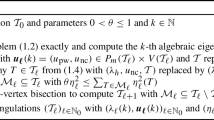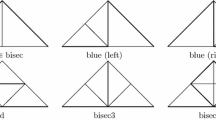Abstract
This paper studies adaptive finite element methods (AFEMs), based on piecewise linear elements and newest vertex bisection, for solving second order elliptic equations with piecewise constant coefficients on a polygonal domain Ω⊂ℝ2. The main contribution is to build algorithms that hold for a general right-hand side f∈H −1(Ω). Prior work assumes almost exclusively that f∈L 2(Ω). New data indicators based on local H −1 norms are introduced, and then the AFEMs are based on a standard bulk chasing strategy (or Dörfler marking) combined with a procedure that adapts the mesh to reduce these new indicators. An analysis of our AFEM is given which establishes a contraction property and optimal convergence rates N −s with 0<s≤1/2. In contrast to previous work, it is shown that it is not necessary to assume a compatible decay s<1/2 of the data estimator, but rather that this is automatically guaranteed by the approximability assumptions on the solution by adaptive meshes, without further assumptions on f; the borderline case s=1/2 yields an additional factor logN. Computable surrogates for the data indicators are introduced and shown to also yield optimal convergence rates N −s with s≤1/2.
Similar content being viewed by others
References
I. Babuška, A. Miller, A feedback finite element method with a posteriori error estimation. I. The finite element method and some basic properties of the a posteriori error estimator, Comput. Methods Appl. Mech. Eng. 61(1), 1–40 (1987).
P. Binev, W. Dahmen, R. DeVore, Adaptive finite element methods with convergence rates, Numer. Math. 97, 219–268 (2004).
P. Binev, R. DeVore, Fast computation in adaptive tree approximation, Numer. Math. 97, 193–217 (2004).
S. Brenner, L.R. Scott, The Mathematical Theory of Finite Element Methods, Springer Texts in Applied Mathematics, vol. 15 (Springer, Berlin, 2008).
J.M. Cascón, C. Kreuzer, R.H. Nochetto, K.G. Siebert, Quasi-optimal convergence rate for an adaptive finite element method, SIAM J. Numer. Anal. 46, 2524–2550 (2008).
W. Dörfler, A convergent adaptive algorithm for Poisson’s equation, SIAM J. Numer. Anal. 33, 1106–1124 (1996).
G. Hardy, J.E. Littlewood, G. Pólya, Inequalities (Cambridge Univ. Press, Cambridge, 1951).
R.B. Kellogg, On the Poisson equation with intersecting interfaces, Appl. Anal. 4, 101–129 (1974/75).
W.F. Mitchell, A comparison of adaptive refinement techniques for elliptic problems, ACM Trans. Math. Softw. 15, 326–347 (1989).
P. Morin, R.H. Nochetto, K.G. Siebert, Data oscillation and convergence of adaptive FEM, SIAM J. Numer. Anal. 38, 466–488 (2000).
P. Morin, R.H. Nochetto, K.G. Siebert, Local problems on stars: A posteriori error estimators, convergence, and performance, Math. Comput. 72, 1067–1097 (2003).
R.H. Nochetto, Pointwise a posteriori error estimates for elliptic problems on highly graded meshes, Math. Comput. 64, 1–22 (1995).
R.H. Nochetto, K.G. Siebert, A. Veeser, Theory of adaptive finite element methods: an introduction, in Multiscale, Nonlinear, and Adaptive Approximation, ed. by R. DeVore, A. Kunoth (Springer, Berlin, 2009), pp. 409–542.
R. Stevenson, An optimal adaptive finite element method, SIAM J. Numer. Anal. 42, 2188–2217 (2005).
R. Stevenson, Optimality of a standard adaptive finite element method, Found. Comput. Math. 7, 245–269 (2007).
Acknowledgements
This research was supported by the Office of Naval Research Contracts ONR-N00014-08-1-1113, ONR N00014-09-1-0107; the AFOSR Contract FA95500910500; the ARO/DoD Contract W911NF-07-1-0185; the NSF Grants DMS-0915231, DMS-0807811, and DMS-1109325; the Agence Nationale de la Recherche (ANR) project ECHANGE (ANR-08-EMER-006); the excellence chair of the Fondation “Sciences Mathématiques de Paris” held by Ronald DeVore. This publication is based on work supported by Award No. KUS-C1-016-04, made by King Abdullah University of Science and Technology (KAUST).
Author information
Authors and Affiliations
Corresponding author
Additional information
Communicated by Wolfgang Dahmen.
Rights and permissions
About this article
Cite this article
Cohen, A., DeVore, R. & Nochetto, R.H. Convergence Rates of AFEM with H −1 Data. Found Comput Math 12, 671–718 (2012). https://doi.org/10.1007/s10208-012-9120-1
Received:
Revised:
Accepted:
Published:
Issue Date:
DOI: https://doi.org/10.1007/s10208-012-9120-1




